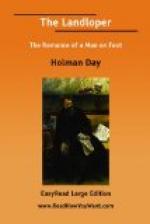Mr. Converse’s discouragement of such hopes would have been even more emphatic had he ever dreamed that this apostle whom he had sent out into the field was coddling the audacious hope that Mr. Converse himself by some miracle might be put into the governor’s chair.
The orators proceeded, one after the other. They were applauded. They retired.
Walker Farr was oppressed by the lugubrious conviction that he was the only man in that great assemblage who felt enough of the zealot’s fire to be willing to put all his hopes to the test.
He looked at the faces on the platform. There sat Colonel Dodd, wearing his expression assumed for that day and date—smug political hypocrisy.
His henchmen winged out to right and left of him. They represented finance and respectability.
Sometimes political rebels will gallantly and audaciously venture when they rail behind the backs of their leaders; but when those leaders appear and fill the foreground with their personalities the rebels subside; they are impressed by the men whom they behold. They defer, even when they are stung by knowledge of their leaders’ principles.
Colonel Dodd and those with him were the accredited leaders.
Delegates glared, but were cowed and silent.
Farr pondered. Perhaps the advice of Mr. Converse was best:
“Take what we can get in our first skirmish. Keep it for the nucleus of what we hope to get later. If we put all to the test in our first fight against forces that have been in power for all the years and lose, then the cause gets a setback which may discourage our men for ever.”
And Mr. Converse, having so declared, had remained away from the convention that day, feeling that no more was to be gained.
“And I move you, Mr. Chairman,” called a voice, “that the nominations for governor do now close.”
This had been the custom in the past.
It was not in the minds of that convention that another candidate would be put forward. Governor Harwood was waiting in an anteroom, thumbing the leaves of his speech, and all the delegates knew it. All desired to expedite matters, nominate by acclamation, hear the inevitable speech, and go home.
“One moment before that motion is seconded!”
The voice was so loud, so clear, so dominant, so ringing, that the effect on the convention was as galvanically intense as if somebody had blown upon a bugle.
Walker Farr had risen to his feet.
Colonel Dodd set his curved palm at his mouth and from behind the chairman shot a few words at the presiding officer as one might shoot pellets from a bean-shooter. The chairman scowled impatiently at Farr, and a delegate among those who watched eagerly for signals from the throne rose half-way to his feet and bellowed, “Question!” The cry was taken up by other delegates, just as the unthinking mob follows a cheer-master.




